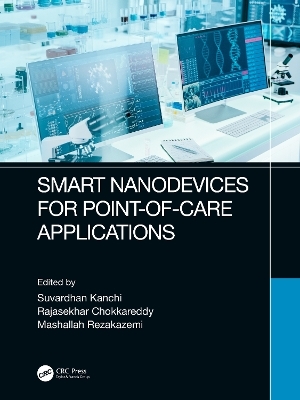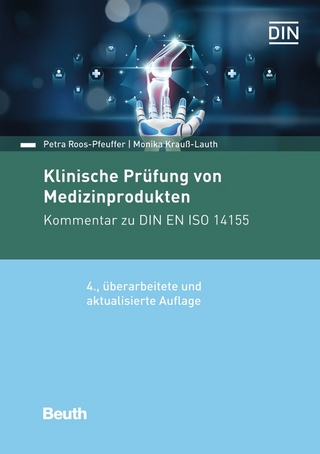
Smart Nanodevices for Point-of-Care Applications
CRC Press (Verlag)
978-0-367-74024-5 (ISBN)
Smart Nanodevices for Point-of-Care Applications examines the latest trends on the capabilities of nanomaterials for point-of-care (PoC) diagnostics and explains how these materials can help to strengthen, miniaturize, and improve the quality of diagnostic devices. A thorough explanation of all-in-one nanosmart devices is included, incorporating all of the applications and fundamentals of these smart devices.
This book provides practical information on the following: novel and effective smart materials, better-quality health management, effective management of a disease, potential point-of-care devices, and mobile nanosensors.
Additional Features
Includes in-depth research based collation of the latest trends of smart devices
Provides practical information on all-in-one nanosmart devices
Explains how nanomaterials can help to strengthen and improve the quality of diagnostic devices
Emphasizes the development of smart nanodevices, especially the miniaturization aspect
Dr Suvardhan Kanchi is an Associate Professor in the Department of Chemistry, Sambhram Institute of Technology, and Bengaluru, India since February 2021. His research interest includes, SMART Materials for Device Applications, SMARTPHONE based Sensing Systems, Nanodiagnostics, Computational Chemistry, NanoElectrochemistry, Environmental Chemistry, Green-Nanotechnology. He has published more than 80 research articles in SCI journals, 19 book chapters and edited 10 books with PanStanford-CRC press, Singapore, Scrivener-Wiley Publisher and Elsevier etc. He has worked as a Postdoctoral Fellow, Research Associate and Research Fellow in Department of Material Science and Engineering, Feng Chia University, Taiwan and Department of Chemistry, Durban University of Technology, Durban, South Africa in the field of Nanotechnology, Electrochemistry and Biosensors. He is a life and senior member of several international professional organizations. Dr Rajasekhar Chokkareddy is currently working as an Associate Professor in the Department of Chemistry, Aditya College of Engineering & Technology, Surampalem, East Godavari, India. He’s Y2 rated researcher from National Research Foundation South Africa. He has worked as a Postdoctoral Fellow in the Department of Chemistry, Durban University of Technology Durban, South Africa in the area of electrochemical sensors/biosensors and thermophysical properties of ionic liquids. Dr Rajasekhar Chokkareddy received his doctorate from Durban University of Technology, Durban, South Africa. He completed his MSc (Organic Chemistry) at Sri Venkateswara University, India. His main research interest focuses on the development of electrochemical sensors/biosensors for the various pharmaceutical drugs, nanoparticles based on the green synthesis, separation techniques, and synthesis of ionic liquid functionalised nanocomposites as well as thermophysical properties of ionic liquids. He has already published 25 papers and 15 book chapters in various peer-reviewed international journals. He is also having reviewer experiences for many international journals. Dr Mashallah Rezakazemi received his BSc and MSc degrees in 2009 and 2011, respectively, both in chemical engineering, from the Iran University of Science and Technology (IUST), and his PhD from the University of Tehran (UT) in 2015. In his first appointment, Rezakazemi has been serving as a Professor in the Faculty of Chemical and Materials Engineering at the Shahrood University of Technology since 2016. Rezakazemi also received his degree promotion to Associate Professor in 2019. Specifically, his research in engineered and natural environmental systems involves: (i) membrane-based processes for energy-efficient desalination, CO2 capture, gas separation, and wastewater reuse; (ii) sustainable production of riched gas stream, water, and energy generation with the engineered membrane; (iii) environmental applications and implications ofnanomaterials; and (iv) water and sanitation in developing countries.
Chapter 01
Antimicrobial applications of nanodevices prepared from metallic nanoparticles and its role in controlling infectious diseases
Chapter 02
Asthma epidemiology, etiology, pathophysiology and management in current scenario
Chapter 03
Recent Trends in Evaluating the Mechanistic Aspects of Alzheimer’s Disease and its Diagnosis with Smart Devices
Chapter 04
Eco-friendly synthesis of metal nanoparticles for smart nanodevices in the treatment of diseases
Chapter 05
Raman SERS nanodevices: The next generation multiplex tools for cancer diagnostics
Chapter 06
Smartphone-based Nanodevices for Point-of-Care Diagnostics
Chapter 07
Current and future prospects in the treatment of chronic obstructive pulmonary disorders
Chapter 08
Screening and pharmacological management of neuropathic pain
Chapter 09
Clinical Use of Innovative Nanomaterials in dentistry
Chapter 10
Graphene-based electrochemical and biosensors for multifaceted applications in healthcare
Chapter 11
Latest trends in the bio-imaging using quantum dots
Chapter 12
Quantum dots as a versatile tool for Bio-imaging applications
Chapter 13
Nano devices for drug delivery systems
Chapter 14
Nanodevices for the Detection of Cancer Cells
Chapter 15
Nanomaterial Modified Pencil Graphite Electrode as a Multiplexed Low-Cost Point of Care Devices
Chapter 16
An Outbreak of Oxidative Stress in Pathogenesis of Alzheimer’s disease
Chapter 17
Applications of Nanotechnology and Nano-devices for the Early-stage Detection of Cancer Cells
Chapter 18
Nanoparticles: The promising future of advanced diagnosis and treatment of neurological disorders
Chapter 19
Advances in Regenerative Medicine and Nano-based Biomaterials
Chapter 20
Magnetic nanocomposites and their biomedical applications
Chapter 21
Ultrathin Graphene Structure, Fabrication and Characterization for Clinical Diagnosis Applications
Chapter 22
3D Printed Nanodevices of Pharmaceutical and Biomedical Relevant
Chapter 23
Nano fluids: A basic information on preparation, stability and applications
Chapter 24
Recent trends in nanomaterials-based electrochemical biosensors for biomedical applications
Chapter 25
Impact of calcium ions (Ca2+) and its signalling in Alzheimer’s and other neurological related disorders
| Erscheinungsdatum | 13.06.2022 |
|---|---|
| Zusatzinfo | 56 Tables, black and white; 85 Line drawings, color; 2 Line drawings, black and white; 53 Halftones, color; 5 Halftones, black and white; 138 Illustrations, color; 7 Illustrations, black and white |
| Verlagsort | London |
| Sprache | englisch |
| Maße | 210 x 280 mm |
| Gewicht | 843 g |
| Themenwelt | Medizin / Pharmazie ► Physiotherapie / Ergotherapie ► Orthopädie |
| Technik ► Maschinenbau | |
| Technik ► Medizintechnik | |
| Technik ► Umwelttechnik / Biotechnologie | |
| ISBN-10 | 0-367-74024-9 / 0367740249 |
| ISBN-13 | 978-0-367-74024-5 / 9780367740245 |
| Zustand | Neuware |
| Informationen gemäß Produktsicherheitsverordnung (GPSR) | |
| Haben Sie eine Frage zum Produkt? |
aus dem Bereich


